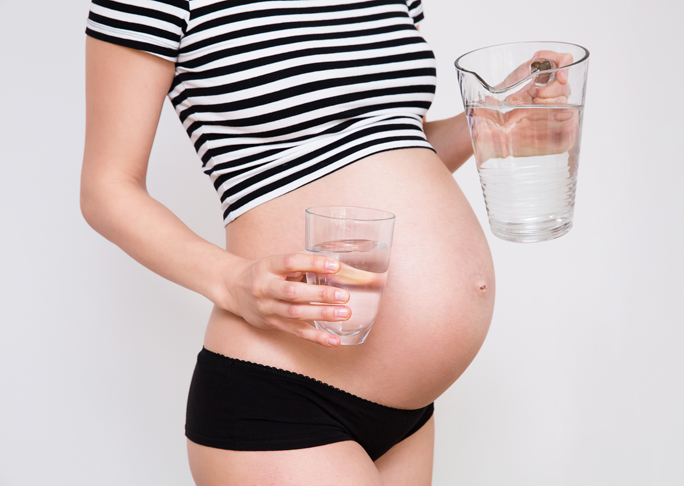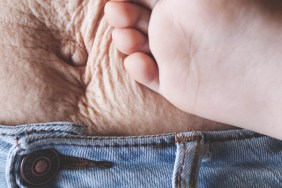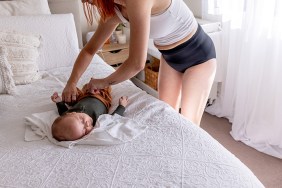For most women, especially those who’ve had multiple children, an unfortunate part of pregnancy and the post-partum period is the “wee” problem of incontinence. For me, my third pregnancy has been the killer. I’ve been fairly unwell and I discovered early on that vomiting and less than stellar pelvic floor muscles do not make for a fabulous combination. Once I hit 18 weeks and was still throwing up daily, I had the lovely experience of peeing my pants while vomiting into a bucket. Not the dignified look I was aiming for.
As embarrassing as it is to admit (especially to millions on the internet – hello!), the reality is that many women experience some degree of incontinence during pregnancy or following birth. Incontinence is common, but shouldn’t be considered a natural part of having a baby. For most women, incontinence is usually mild and can be cured or better managed with treatment.
To get more of an idea of what causes incontinence and what can be done to help, I spoke to two doctors with experience in this area.
Dr Colin Walsh is a Sydney Gynaecologist and Obstetrician who spent three years caring exclusively for women with incontinence and vaginal prolapse.
Dr Lucia Mandile is a family GP working on the Central Coast of NSW. As a GP she is often the first point of contact for women with concerns regarding incontinence and she sees many women both during pregnancy and in the early postnatal period experiencing varying degrees of incontinence.
What causes incontinence?
Dr Colin Walsh: The most common cause of sudden incontinence is a urinary tract infection (UTI). Pregnant women are at increased risk of UTI due to the effects of pregnancy on the kidneys and bladder. Many women have persistent urinary incontinence before, during or after pregnancy. Usually, this is “stress incontinence” due to weakness in the pelvic floor muscles, with leakage triggered by coughing, sneezing, laughing or during physical exercise or sexual intercourse. Stress incontinence is more common in women who have had previous pregnancies, who are overweight and who smoke or have a chronic cough.
Dr Lucia Mandile: Women who have had multiple pregnancies, twins (or triplets or more!), a long labour or who have a higher BMI are more at risk. Faecal incontinence is often experienced by women who have had severe tears during their delivery and requires specialist review.
Dr Colin Walsh: Urinary incontinence during pregnancy or postnatally is extremely common. It affects almost half of pregnant women, most often in the late third trimester or immediately following the birth.
Will it just go away on its own?
Dr Mandile: Early mild symptoms can be managed with simple exercises to strengthen the pelvic floor muscles, and/or bladder training. If the symptoms are ignored they can get worse. Medications or referral to specialist for surgical options can also be considered where necessary.
Dr Walsh: For most women, who only experience mild urinary incontinence late in pregnancy, the problem will resolve by the time their baby is a few months old. It is estimated that 10% of women will still have incontinence 12 months after the birth. Women who experienced leakage very early in pregnancy are more likely to have ongoing problems.
Does incontinence only affect women who’ve had a vaginal birth?
Dr Walsh: Both the pregnancy itself and the type of delivery contribute to urinary incontinence. Women who have vaginal deliveries, particularly difficult vaginal births or large babies, have higher rates of incontinence than women who have caesarean deliveries. However, we know that women who have an elective caesarean section are still more likely to have urinary incontinence than women who have never been pregnant.
What can women be doing to reduce the risk and impact of incontinence during and following pregnancy?
Dr Walsh: Many healthy women will have slight incontinence in pregnancy, which resolves after the pregnancy without any treatment being needed. However, urinary leakage outside of pregnancy is never normal and you should always seek advice from your GP or gynaecologist. To minimise troublesome incontinence during pregnancy, women should avoid smoking, keep caffeine intake to a minimum (maximum 1-2 cups of tea or coffee per day) and keep an eye on weight gain during pregnancy.
Pregnant women should also be vigilant for urinary tract infection, which is common and often worsens incontinence. Drink plenty of water and if you have any burning or stinging during urination ask your GP to send a urine sample for testing prior to commencing antibiotics.
Do pelvic floor exercises make a difference?
Dr Walsh: Pregnancy is the ideal time to provide education on the life-long benefits of regular pelvic floor exercises. Women who perform regular pelvic floor exercises during pregnancy are less likely to have urinary incontinence at 3 months postpartum.
Remember that, just like any exercise, technique is very important. Before women embark on pelvic floor muscle training, they should have their technique assessed by a physiotherapist or gynaecologist, to ensure they are performing the exercises correctly. Pelvic floor exercises should be performed 2-3 times daily to see benefit.
What would you say to a woman who was embarrassed or reluctant to talk about incontinence?
Dr Mandile: I see a lot of women in the antenatal period who are diligent in discussing their symptoms, whatever they may be, to ensure there is no risk to their baby. Interestingly, I find many of them neglect their health and wellbeing in the postpartum period, not surprisingly because they are so focused on their lovely bundle of joy. It is really important for women to ensure they make an appointment to see their GP not only for their baby’s checkup, but for themselves at the 6 week postpartum mark. This is the time to discuss those interesting and awkward changes the body undergoes after making a human being!
Preventative care is the main component of my job as a GP, but more importantly making my patients feel comfortable to talk about anything concerning them, especially those embarrassing things. When I see a woman with their new baby I always remind them how important self care is. They are not just a mum or partner, (or daughter, grand-daughter, best friend or employee), but an important person whose health and wellbeing is vitally important.
Dr Walsh: Women should never feel embarrassed or ashamed to discuss urinary incontinence with their GP or obstetrician. During or after pregnancy is the perfect time to start this conversation. Overall, 1-in-4 adult women suffer with incontinence, making it more common than asthma, diabetes, high blood pressure and a whole list of chronic medical problems that receive far more attention. For doctors who deal with urinary incontinence it is not an embarrassing issue at all. Given the enormous impact incontinence has on the quality of our patients’ lives, we want women to speak up, not suffer in silence.
When should women seek help?
Dr Walsh: Any woman who has urinary incontinence should ask for help. Despite the huge impact this problem has on quality of life, many women never seek assistance. It can seem difficult to raise this issue if you have known your family doctor for many years, but never feel embarrassed. There is a whole team of “continence clinicians”– gynaecologists, physiotherapists, GPs, and nurse continence advisors – who can help you. There is also a free national continence helpline (1800 33 00 66) and a fabulous website by the Continence Foundation of Australia where you can get advice on bladder problems.
Please, please, please don’t put up with urinary incontinence.
More on pregnancy health:
- The Shocking But Totally Normal Changes Your Body Goes Through Postpartum
- My Postnatal Depression Was So Severe I Didn’t Recognise Myself
- How to Manage Back Pain During Pregnancy
Image: Getty








